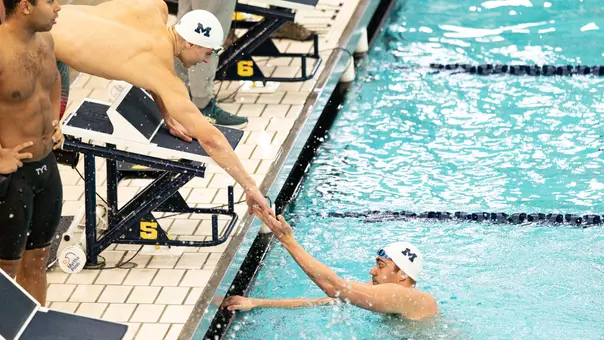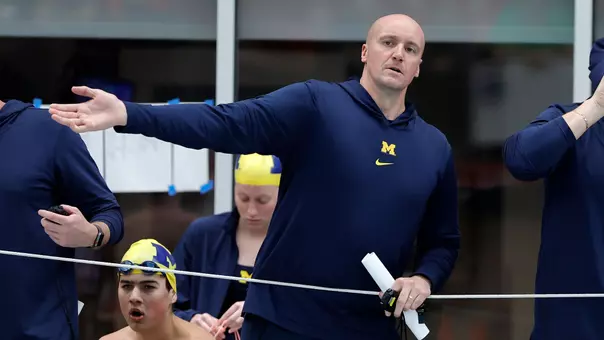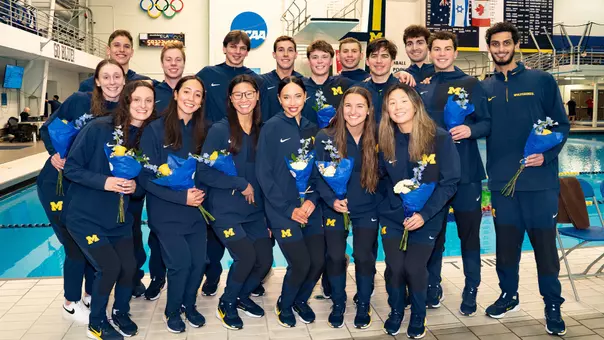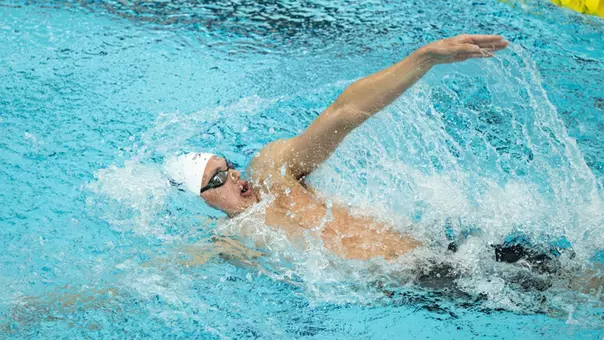
Alumni Spotlight: Chris Thompson
2/18/2015 12:00:00 AM | Men's Swimming & Diving

The University of Michigan men's swimming and diving team has produced dozens of high-level distance swimmers, but one of the best has to be Chris Thompson (1998-2001). Even 14 years after graduating, Thompson still holds the Big Ten and University of Michigan records in the 1,000-yard freestyle and 1,650-yard freestyle. He often saved his best swimming for the postseason, winning the 500-yard freestyle and 1,650-yard freestyle at all four of his Big Ten Championships meets and being named Big Ten Swimmer of the Year twice.
After his junior year at Michigan, Thompson represented the United States at the 2000 Olympics in Sydney, claiming a bronze medal in the 1,500-meter freestyle. The following spring in his final NCAA Championships race, he won a national title in the 1,650-yard freestyle, setting an American record (14:26.62) that stood until 2012. That record is coincidentally now held by another former Michigan distance swimmer, Connor Jaeger (14:23.52).
Thompson currently works at Roush Industries with the material supply chain group. He's primarily based at Roush Performance where he does Ford Mustang and F-150 vehicle upgrades as well as sell retail upgrade kits, parts and accessories for a variety of vehicles. Swimming is still a huge part of his life, as he coaches part time with the Plymouth Canton Cruisers. He still swims for exercise and enjoys competing in open water races during the summer.
He is married to former U-M women's swimmer Lindsey Smith, a nine-time NCAA All-American and six-time Big Ten individual champion in her own right. The two live in Dexter with their dog, Oliver, and are expecting their first child in April.
Q. You lived your childhood out west. Why did you want to come to Michigan?
A. I was born in San Diego, California, but grew up in Southern Oregon. I was a distance swimmer in middle and high school and had the goal of making the Olympic Games. After reviewing colleges and swim programs across the United States, going to Michigan was an easy decision because of the quality academics, the world-class swim program and, of course, one of the greatest coaches in the world in Jon Urbanchek. Having the opportunity to be coached by Jon and Eric Namesnik was a great honor and I'm certain I wouldn't have had the success I did without them.
Q. At the 2000 Summer Olympics in Sydney, you won a bronze medal and set an American record in the 1,500-meter freestyle. What do you remember most about that experience and that race, in particular?
A. The 2000 Olympics were a great experience; bringing together people from all over the world to celebrate athletics and represent ones country is indescribable. Any time I represented the United States internationally was an honor and being a part of the U.S. Olympic Team was a highlight of my life. Winning bronze was an added bonus and a way to repay all those that helped me get to that point; my parents, coaches, teammates, friends and fans of team USA. The race itself was obviously very nerve-wracking; having to go against Grant Hackett and Kieren Perkins in their home country was intimidating (each were multi-time Olympic gold medalists and world record holders in the 1,500-meter freestyle). Jon believed in me and gave me the confidence I needed just before the race when I wasn't feeling as prepared as I would have liked. He knew I was ready physically and just needed to get mentally set. I believe his last bit of advice to me was "Just Race!" Another piece of advice was from my mom the night before the 1,500 final when she told me to "just smile" and have fun, which sounds funny when you are at the Olympic Games but as I was standing behind the blocks that's what I did and it calmed me down considerably.
Q. Throughout your entire swimming career, what race stands out to you most?
A.I spent 25-plus years swimming competitively so it is tough to determine one race that stands out. Obviously coming through and winning a bronze medal was a big achievement but there are probably two other swims that were just as significant for different reasons. The first was winning the NCAA title and setting the NCAA and American records in the 1,650-yard freestyle. After placing second in that event my first three years at NCAAs, it was great to finally get the victory my senior year. The race itself was a culmination of four years of work to go under the previous record held by Michigan great Tom Dolan. Another great part of that race was standing on the podium with a fellow Michigan swimmer, Tim Siciliano, who finished second.
The other event that had a profound effect on me was my 1,500 prelim/final at the 2004 Olympic Trials. I suffered two broken elbows in a dryland training accident in Colorado Springs about nine weeks before trials in 2004, effectively ending my chances of making the 2004 team. I was just hoping I'd be able to swim again after the injuries and thankfully with the support of Urbs, Lindsey and the fantastic PT staff both at the Olympic Training Center and at Michigan, I was able to get a small portion of my lost conditioning and strength back. While I was not fully healed when I swam at trials, just being able to finish my races showed me that I could find success with the right attitude and refocusing of goals.

Chris Thompson
Q. Some of the records you broke during your time as a competitive swimmer still stand (like Big Ten and U-M records in the 1,000-yard and 1,650-yard freestyles), while others were broken (NCAA, American records in the 1,500-meter freestyle). Given how fast people are going nowadays, are you surprised those lasted for as long as they did? Or that the ones you currently own still stand?
A. I guess I am surprised. It is incredible how much faster swimming is now than it was even 10-15 years ago. Any time you think the sport won't get faster a new training method, technology and/or talented athlete comes along and takes the sport to a new level.
Q. Your coach, Jon Urbanchek, was always big on the middle distance and distance swimmers. If you take a look at the guys that he coached, there were numerous national champions and Olympians. What is it about that program that makes it consistently churn out top-level swimmers?
A. The success of the Michigan swimming and diving program stems from the long-term commitment of its coaches and athletes. From Matt Mann, Gus Stager, Jon Urbanchek and now Mike Bottom, Michigan has been able to maintain the distance-based program. As anyone who has swum for Jon knows, he has an infectious type of personality and it makes you want to work hard and achieve success for him and yourself. The addition of Mike, though, has been great as he has been able to enhance the sprint side of the program which is extremely important in college swimming. And of course, the success of the Michigan programs comes from recruiting the right student-athletes who want to work hard and make a commitment to the program.
Q. In your four years, you never lost the 500-yard freestyle or 1,650-yard freestyle at the Big Ten Championships. Looking back, how were you able to do that?
A. Being able to sweep the distance events at Big Tens every year was not something I expected coming in to college swimming, but after winning the 500 and 1,650 my freshman year, I hoped I could continue to find success in those races as long as I kept improving and avoided becoming content with my results from the previous years. The success I had would not have been possible without the coaches and teammates that pushed me on a daily basis from the University of Michigan and Club Wolverine. Unfortunately, we only won a single team title in my four years at Michigan but I am glad I was able to contribute all the points I could each year.
Q. What made you want to get into coaching?
A. I have been coaching since about 2002 and have always enjoyed working with younger athletes. I had such great coaches in my early years and of course being with Urbs for over seven years helped me realize that my background and experience can help others achieve their goals like my coaches did with me. My favorite part of coaching is seeing these young people I work with gaining self-confidence, doing things they didn't think they could do and learning how to work through adversity to achieve their goals. Swimming is a deeply ingrained part of me and as a lifelong swimmer I hope to always be a part of the sport in some capacity; be that as an athlete, coach, representative and hopefully someday as a parent of swimmers.
Q. Finally, looking back at your time at Michigan, how would you say that impacted your life?
A. Spending nine years of my life training with Michigan made a profound impact on who I am today. While my outward success may have been primarily from a handful of 14-15 minute swims, it was the 20,000-plus miles I've swum in my life that taught me about commitment, hard work, sacrifice, goal-setting and time management. These things are all extremely important in my professional, personal and family life and I developed them all while I was at Michigan.
The Office of Alumni Engagement strives to foster a community, recognize the holistic student-athlete and honor the great Michigan Athletics history. This alumni spotlight illustrates the impact that our alumni are having around the world and how they stay engaged with Michigan.











